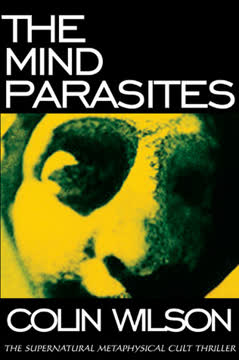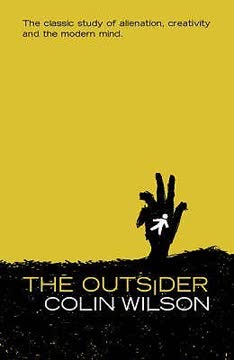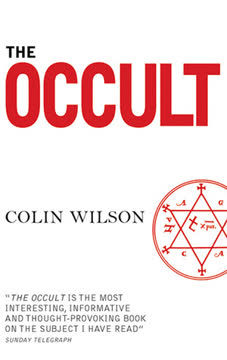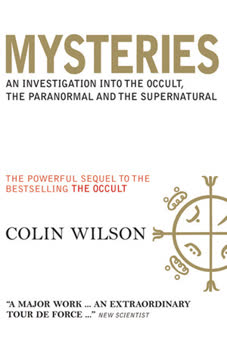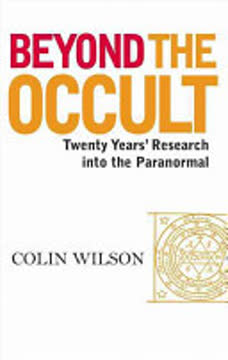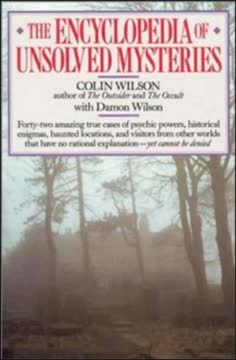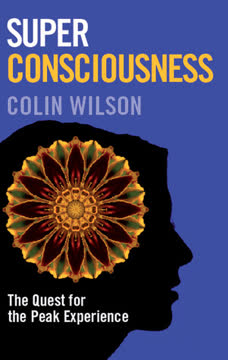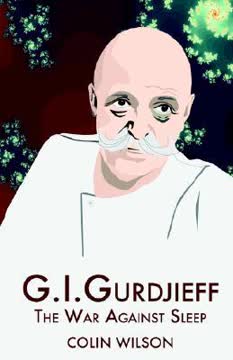Plot Summary
The Suicide That Sparked Everything
The story begins with Professor Gilbert Austin, an archaeologist, learning of the sudden and inexplicable suicide of his old friend, psychologist Karel Weissman. Weissman's death is a shock—he was a man of immense energy and stability, not the type to take his own life. Austin is drawn into the mystery, especially after being named the executor of Weissman's scientific papers. As he sifts through the documents, Austin is haunted by a sense of unease and the feeling that something unseen is at work. This event sets the stage for a journey into the hidden forces that may be influencing not just individuals, but the entire human race.
Archaeological Mysteries Unearthed
Austin's archaeological work in Asia Minor, particularly at the Black Mountain of Karatepe, uncovers strange basalt figurines and evidence of a civilization far older than previously believed. The artifacts bear inscriptions referencing "the great old ones" and "Abhoth the Dark," names that eerily echo the writings of H.P. Lovecraft, a pulp horror author. The discovery of massive stone blocks buried miles beneath the earth, inscribed with unknown symbols, suggests the existence of a lost, possibly non-human civilization. These findings, coupled with the rising global suicide rate, hint at a deeper, more sinister force at play in human history.
The Hidden History of Humanity
Weissman's papers propose a radical theory: around the year 1800, humanity underwent a sudden, catastrophic change. The creative optimism of previous centuries gave way to pessimism, neurosis, and a surge in suicides. Weissman argues that this shift cannot be explained by social or economic factors alone. Instead, he suggests that an invisible, parasitic force began to prey on the human mind, sapping its vitality and creativity. This "mind cancer" is not just a metaphor for neurosis, but a literal psychic invasion that has shaped the course of modern history.
Weissman's Shocking Discovery
Through a combination of self-experimentation with psychedelic drugs and phenomenological introspection, Weissman becomes convinced that the human mind is under attack by real, non-physical entities—mind parasites. These beings feed on human energy, especially the creative and evolutionary impulses, and have subtly manipulated humanity into a state of chronic weakness and despair. Weissman's attempts to fight back are met with intense psychological resistance, culminating in his suicide—a direct result of the parasites' assault.
The Mind Parasites Revealed
Austin, now aware of the parasites' existence, teams up with Wolfgang Reich, a scientist, to investigate further. They realize that the parasites operate by jamming human emotions and perceptions, preventing people from learning from experience and achieving their full potential. The parasites thrive on secrecy and habit, conditioning humanity to ignore its own inner world. The duo's growing understanding of phenomenology—the disciplined exploration of consciousness—becomes their chief weapon in resisting the parasites' influence.
Allies and Enemies Gather
Austin and Reich begin recruiting allies—psychologists, scientists, and thinkers who are open to the possibility of psychic invasion. They form a clandestine group dedicated to fighting the mind parasites, teaching each other techniques of mental discipline and telepathy. However, the parasites are not idle; they strike back, driving many of the group's members to madness or suicide. The battle becomes both psychological and metaphysical, as the group learns to harness previously untapped powers of the mind, including psychokinesis and telepathic communication.
The Battle for Sanity
The group's efforts to resist the parasites lead to a series of intense psychic battles. The parasites attempt to undermine their sense of identity and reality, exploiting every psychological weakness. Austin experiences a night-long confrontation in which he must draw upon a deep, previously unknown source of inner strength to survive. The realization dawns that the parasites are not just external invaders, but manifestations of humanity's own unacknowledged fears and frustrations, amplified by the moon's mysterious influence.
Awakening Hidden Human Powers
As the group masters phenomenological techniques, they discover extraordinary abilities: telepathy, psychokinesis, and the capacity to manipulate matter with thought. These powers are not supernatural, but the result of focusing and aligning the mind's "beam of attention." The group demonstrates their abilities publicly, moving massive objects and even manipulating the moon's rotation. This psychic awakening spreads, offering hope that humanity can overcome its self-imposed limitations and the parasites' grip.
The Parasites Strike Back
Sensing their control slipping, the parasites orchestrate a worldwide crisis. They possess key political leaders, inciting wars and chaos. The group is forced to flee Earth, taking refuge in a spaceship to escape the parasites' reach. In space, free from the moon's influence, they experience a profound liberation of consciousness. The parasites, unable to survive without the psychic energy of the human collective, are forced to abandon their hosts, leading to a mass awakening among the group.
The Spaceward Escape
In the depths of space, Austin and his companions achieve a new level of mental freedom. They realize that the parasites are a kind of psychic cancer, born from humanity's own refusal to realize its potential. The group's telepathic unity allows them to contact other advanced beings in the universe—the "universal police"—and to see themselves as the vanguard of a new phase in human evolution. They return to Earth, determined to share their discoveries and liberate humanity from its self-imposed chains.
Freedom Beyond the Moon
The group uncovers the moon's true nature: it is not just a dead satellite, but a transmitter of psychic energy, home to the remnants of a non-physical, ancient life form. The moon's influence has been a constant irritant, fostering the conditions for the mind parasites to thrive. By using their combined psychic powers, the group alters the moon's rotation, disrupting its effect on Earth and weakening the parasites' hold.
The Moon's Secret Influence
Realizing that the moon's presence is the root of the psychic disturbance, the group undertakes a massive operation to push the moon out of Earth's orbit. Over the course of a year, they use their psychokinetic abilities to accelerate the moon, eventually sending it into the sun. This act not only frees humanity from the moon's malign influence but also releases the trapped life forces within the satellite, allowing them to return to the cosmic cycle.
Humanity's Psychic Revolution
With the parasites defeated and the moon gone, humanity enters a period of rapid psychic and spiritual evolution. The techniques developed by Austin's group are taught to others, leading to a proliferation of "initiates" capable of mind control, telepathy, and other advanced abilities. The world is reorganized under a unified government, and the threat of war and self-destruction recedes. The focus shifts to exploring the vast, uncharted territories of the mind.
The Final Confrontation
Despite their victories, the group recognizes that the parasites are not entirely external—they are the shadow of humanity's own cowardice and passivity. The final battle is not against an alien enemy, but against the habits and fears that keep people from realizing their true potential. By teaching self-mastery and the disciplined use of consciousness, the group ensures that the parasites can never regain their former power.
The Fate of the Mind Parasites
The mind parasites, deprived of their food source and unable to adapt to the new human consciousness, wither and die. Humanity is left to chart its own course, free from the invisible chains that had bound it for centuries. The victory is not just over an external enemy, but over the internal forces of self-doubt and limitation.
The New Evolution
Freed from the parasites and the moon's influence, humanity begins to explore the true potential of the mind. The initiates become the "policemen of the universe," joining a community of advanced beings who guide the evolution of consciousness across the cosmos. The journey is far from over—new mysteries and challenges await—but the human race has taken its first steps toward godhood.
The Vanishing of the Pallas
Years later, the spaceship Pallas, carrying Austin, Reich, and their closest allies, vanishes without a trace during an expedition to Pluto. The ship is found years later, empty and undamaged. The implication is that the crew has transcended physical existence, joining the universal community of evolved minds. Their disappearance becomes a symbol of the next stage in human evolution—a leap into the unknown.
The Legacy of the Outsiders
The story ends by reflecting on the fate of the "outsiders"—those rare individuals who have always felt alienated from ordinary life, driven by a longing for something greater. The battle against the mind parasites is revealed as the latest chapter in the age-old struggle of the outsider to find meaning and purpose in a world that resists change. With the victory over the parasites, the outsider's vision becomes the new reality, and humanity is poised to fulfill its destiny as a race of creators and explorers.
Characters
Gilbert Austin
Austin is an archaeologist and the narrator of the story. Initially skeptical and rational, he is drawn into the mystery of the mind parasites by the suicide of his friend Weissman. Austin's journey is both external—through archaeological digs and scientific investigation—and internal, as he confronts the hidden forces within his own mind. His psychological development is marked by increasing self-awareness, courage, and the mastery of psychic abilities. Austin's relationships with other characters, especially Reich and Weissman, are defined by mutual respect and a shared quest for truth. He embodies the "outsider" archetype: a thinker who refuses to accept the limitations imposed by society or by the parasites.
Karel Weissman
Weissman is a brilliant psychologist whose suicide sets the plot in motion. His posthumous writings reveal the existence of the mind parasites and provide the theoretical foundation for the group's battle against them. Weissman's struggle is deeply psychological—he is both a victim and a pioneer, the first to recognize the true nature of the enemy. His fate illustrates the dangers of confronting the unknown without adequate support, and his legacy inspires Austin and the others to continue the fight.
Wolfgang Reich
Reich is a scientist and Austin's closest collaborator. He brings a rigorous, analytical approach to the investigation of the mind parasites, complementing Austin's more intuitive and romantic perspective. Reich's emotional stability and intellectual curiosity make him an ideal partner in the struggle. He is instrumental in developing the group's psychic abilities and in coordinating their collective efforts. Reich's journey mirrors Austin's, as he moves from skepticism to mastery of the mind's hidden powers.
Sigmund Fleishman
Fleishman is a German psychologist who quickly becomes one of the group's most valuable members. His expertise in the psychology of sexuality and his openness to unconventional ideas make him receptive to the reality of the mind parasites. Fleishman's role is both as a teacher and a student—he helps recruit and train new allies, while also deepening his own understanding of the mind's potential. His presence adds depth to the group's exploration of the relationship between sexuality, creativity, and psychic health.
The Grau Brothers (Louis and Heinrich)
The Grau brothers are notable for their natural telepathic connection and their rapid mastery of psychokinesis. Their ability to combine their mental energies serves as a model for the group's collective efforts. The brothers' relationship exemplifies the power of unity and mutual support in overcoming the parasites. Their development from talented individuals to key members of the psychic vanguard highlights the importance of collaboration in the struggle for mental freedom.
Felix Hazard
Hazard is a writer and public figure who becomes a "zombi"—a human entirely controlled by the mind parasites. He is charismatic, nihilistic, and exerts a malign influence on those around him, especially the young and vulnerable. Hazard's role is that of the antagonist within humanity, a symbol of the seductive power of despair and self-destruction. His eventual downfall is a turning point in the battle against the parasites.
Obafeme Gwambe
Gwambe is a charismatic African leader who, under the influence of the parasites, incites war and chaos on a global scale. His actions are not entirely his own—he is manipulated by the parasites to serve their agenda of distraction and destruction. Gwambe's rise and fall illustrate the ease with which the parasites can exploit human ambition and resentment, turning individuals into instruments of collective madness.
President Lloyd Melville
Melville is the President of the United States during the crisis. He represents the limitations of traditional leadership in the face of unprecedented challenges. Melville is well-meaning but lacks the vision and strength to confront the true nature of the threat. His interactions with Austin and the group highlight the gap between ordinary political power and the new psychic reality emerging in humanity.
Georges Ribot
Ribot is a French intellectual who is initially recruited into the group but ultimately betrays them under the parasites' influence. His fate serves as a warning about the dangers of insufficient mental discipline and the ease with which even intelligent people can be subverted. Ribot's story underscores the necessity of rigorous self-mastery in the fight against psychic invasion.
Holcroft
Holcroft is a psychologist with a natural, instinctive connection to the deeper layers of the mind. His abilities as a "medium" allow the group to explore regions of consciousness inaccessible to others. Holcroft's insights are crucial in understanding the moon's influence and the true nature of the parasites. His development from a passive observer to an active participant exemplifies the transformative power of self-discovery.
Plot Devices
Framing Narrative and Found Documents
The novel employs a framing device, presenting the main narrative as a composite document assembled from Austin's papers, tape recordings, and reports. This structure creates a sense of authenticity and immediacy, blurring the line between fiction and reality. The use of found documents allows for multiple perspectives and layers of interpretation, inviting the reader to piece together the truth from fragmented evidence.
Psychic Invasion as Metaphor and Reality
The central plot device is the existence of mind parasites—non-physical entities that feed on human energy and manipulate consciousness. These beings function both as literal antagonists and as metaphors for neurosis, depression, and the self-destructive tendencies of modern society. The ambiguity of their nature—are they real, or projections of the human psyche?—adds depth and complexity to the narrative.
Phenomenology and Self-Observation
The group's chief weapon against the parasites is phenomenology—the disciplined exploration and mapping of consciousness. This philosophical approach becomes a practical tool for self-mastery, enabling characters to resist psychic manipulation and unlock hidden abilities. The narrative structure mirrors this process, with frequent introspective passages and detailed accounts of mental states.
Foreshadowing and Historical Parallels
The novel is rich in foreshadowing, drawing parallels between ancient civilizations, historical catastrophes, and the current crisis. The archaeological discoveries at Karatepe, the references to Lovecraft's fiction, and the recurring theme of the moon's influence all serve to build a sense of inevitability and cosmic significance. The story suggests that humanity's present predicament is the latest chapter in a long, hidden history of psychic struggle.
Escalation from Personal to Cosmic
The plot moves from the personal tragedy of Weissman's suicide to a global and ultimately cosmic conflict. The escalation is mirrored in the characters' development, as they move from individual self-mastery to collective action and, finally, to participation in a universal community of evolved minds. This structure reinforces the theme of evolution—both personal and collective—as the ultimate goal.
Analysis
The Mind Parasites is both a metaphysical thriller and a philosophical treatise, using the conventions of science fiction and horror to explore the deepest questions of human existence. At its core, the novel is a meditation on the nature of consciousness, the sources of creativity and despair, and the possibility of transcending the limitations imposed by habit, fear, and social conditioning. The mind parasites are a brilliant metaphor for the forces—internal and external—that sap human vitality and keep individuals from realizing their true potential. Wilson's message is ultimately optimistic: by turning inward, mastering the mind, and embracing the "outsider" perspective, humanity can overcome its self-imposed chains and step into a new era of freedom and creativity. The book's relevance endures in an age of distraction, anxiety, and spiritual malaise, offering both a warning and a blueprint for personal and collective transformation.
Last updated:
FAQ
Synopsis & Basic Details
What is The Mind Parasites: The Supernatural Metaphysical Cult Thriller about?
- A Psychic Cancer Unveiled: The novel follows archaeologist Professor Gilbert Austin as he uncovers a hidden, parasitic intelligence feeding on humanity's mental and emotional energy, causing widespread neurosis, despair, and self-destruction. This "mind cancer" is revealed through the posthumous papers of his friend, psychologist Karel Weissman, whose inexplicable suicide sparks Austin's investigation.
- Evolutionary Battle for Consciousness: It chronicles Austin's journey from skeptical academic to a leader in a psychic war, as he and a growing group of "initiates" learn to harness latent human mental powers like telepathy and psychokinesis. Their ultimate goal is to liberate humanity from these invisible entities, which have subtly manipulated history and suppressed human evolution for centuries.
- Cosmic Liberation and New Dawn: The narrative escalates from personal introspection to a global and then cosmic struggle, culminating in the group's escape to space, the discovery of the moon's role as a psychic irritant, and its eventual removal. The story concludes with humanity on the brink of a new evolutionary phase, free to explore the vast, uncharted territories of the mind.
Why should I read The Mind Parasites: The Supernatural Metaphysical Cult Thriller?
- Philosophical Depth & Thrilling Plot: Readers seeking a unique blend of intellectual science fiction and metaphysical horror will find Colin Wilson's exploration of consciousness, free will, and human potential deeply engaging. The book uses a thrilling plot to convey profound philosophical ideas, making it more than just a genre novel.
- Unique Take on Lovecraftian Horror: For fans of H.P. Lovecraft, Wilson offers a fascinating subversion of cosmic horror, transforming external, unknowable entities into internal, psychological adversaries that humanity can actively fight and overcome. It's a story that empowers rather than paralyzes with dread.
- Optimistic Vision of Human Evolution: Unlike many dystopian or pessimistic sci-fi narratives, The Mind Parasites presents a powerfully optimistic vision of humanity's future. It champions the idea that self-awareness, mental discipline, and collective consciousness can unlock god-like powers and lead to a higher stage of evolution, offering a blueprint for personal and societal transformation.
What is the background of The Mind Parasites: The Supernatural Metaphysical Cult Thriller?
- Colin Wilson's "Outsider" Philosophy: The novel is deeply rooted in author Colin Wilson's own philosophical work, particularly The Outsider, which explores individuals who feel alienated from conventional society but possess a heightened awareness and potential for deeper experience. The mind parasites are presented as the force actively suppressing this "outsider" consciousness in humanity.
- Lovecraftian Inspiration and Subversion: Commissioned by August Derleth of Arkham House, the book was conceived as a "Lovecraft novel." Wilson acknowledges Lovecraft's genius for terror but critiques his pessimism, choosing instead to place the "monsters inside the mind" rather than as external, unconquerable cosmic entities, as detailed in the preface. This transforms Lovecraft's dread into a challenge for human will.
- Post-War Existential and Psychological Context: Written in 1967, the novel reflects mid-20th-century anxieties about rising suicide rates, societal neurosis, and the potential for self-destruction (e.g., atomic war), while also drawing on contemporary psychological and philosophical movements like phenomenology (Husserl) and transpersonal psychology (Huxley, Jung, Gurdjieff).
What are the most memorable quotes in The Mind Parasites: The Supernatural Metaphysical Cult Thriller?
- "Man is an animal who is trying to evolve into a god.": This quote, from Karel Weissman's Historical Reflections, encapsulates the novel's central theme of human potential and the evolutionary drive. It defines the inherent struggle and ultimate purpose of humanity, positioning the mind parasites as the primary obstacle to this divine self-realization.
- "The mind, as I well knew, was a universe of its own.": Spoken by Austin during his profound inner battle, this line highlights the core phenomenological insight that the human mind is an infinite, unexplored territory. It shifts the battleground from external reality to internal consciousness, emphasizing the boundless inner space available for exploration and mastery.
- "Man is not alone. You could be the last man alive in the universe, and you would not be alone.": This powerful realization, achieved by Austin and Reich in deep space, signifies the ultimate transcendence of individual isolation. It speaks to the interconnectedness of all consciousness and the existence of a "universal powerhouse" or "universal police," offering profound comfort and purpose beyond earthly concerns.
What writing style, narrative choices, and literary techniques does Colin Wilson use?
- Academic-Philosophical First-Person Narrative: Wilson employs a highly intellectual, first-person narrative voice through Professor Gilbert Austin, blending scientific exposition, philosophical discourse, and personal experience. This creates a unique tone that is both analytical and deeply personal, inviting the reader into Austin's thought processes and discoveries.
- Framing Narrative and Found Documents: The story is presented as a "composite document" compiled by future historians, including Austin's tape recordings, autobiographical notes, and Weissman's papers. This meta-narrative structure lends an air of authenticity and historical weight, blurring the lines between fiction and a speculative future history.
- Integration of Real-World Figures and Concepts: Wilson seamlessly weaves in references to real philosophers (Husserl, Heidegger, Spengler), psychologists (Jung, Maslow), writers (Lovecraft, Poe, Shaw), and historical events, grounding the fantastical elements in a rich tapestry of intellectual and cultural history. This intertextuality enriches the narrative and reinforces its philosophical arguments.
Hidden Details & Subtle Connections
What are some minor details that add significant meaning?
- The "Ginger Tom" Tobacco Scent: Austin's momentary pause in his mental descent to recall his grandfather's pipe tobacco, "Ginger Tom," and his Lincolnshire cottage, is a subtle yet powerful illustration of the mind's vast, interconnected memory landscape. It demonstrates how a seemingly trivial sensory detail can instantly reconstruct an entire, vivid "universe" of personal history, foreshadowing the deeper exploration of memory and past lives.
- The Secretary's "Sexually Overcharged" State: Reich's discovery that many A.I.U. employees, particularly a specific secretary, are "sexually overcharged" due to parasite interference, subtly links sexual frustration to the parasites' energy-draining activities. This detail highlights how the parasites exploit and pervert fundamental human drives, turning a source of vitality into a breeding ground for neurosis and perversion, as later explored by Fleishman.
- The "God of Archaeology" Intuition: Austin's recurring feeling of "the god of Archaeology" being on his side, guiding his discoveries, is a subtle foreshadowing of the "benevolent principle of purpose in the universe" he later contacts during his night battle. It suggests an inherent, guiding force in existence that subtly aids humanity's evolution, even before Austin consciously recognizes it.
What are some subtle foreshadowing and callbacks?
- Karel's "Black Dots" Vision: Weissman's early ether experiments, where he found "rows of black dots extremely significant," subtly foreshadow the non-physical, almost abstract nature of the mind parasites. These dots could be an early, uninterpreted glimpse into the "metallic" and "shadowy" presence of the parasites before their true nature is understood.
- Austin's Initial "Coldness" and Shudder: When Reich discusses the rising suicide rates, Austin feels "a touch of coldness inside me, as if I had suddenly become aware of the eyes of some dangerous creature." This is a direct, unconscious premonition of the parasites' presence, a primal alarm bell ringing before his conscious mind can process the threat, highlighting their subtle, insidious influence.
- The "Dream of History" Metaphor: Austin's early musing, "After all, civilization is a kind of dream. Supposing a man suddenly woke up from that dream? Wouldn't it be enough to make him commit suicide?", directly foreshadows Weissman's theory of humanity being trapped in a "history trap" by the parasites. It sets up the core conflict: awakening from a collective delusion to confront a deeper reality.
What are some unexpected character connections?
- The Grau Brothers' Telepathic Amplification: Louis and Heinrich Grau's natural telepathic link allows them to "reinforce one another's efforts in a pulse rhythm" for psychokinesis, effectively using each other's minds as "ruby lasers." This connection is not just a unique ability but a blueprint for the collective consciousness the group aims to achieve, demonstrating the power of unified mental effort.
- Fleishman's Wife's "Proprietary Fondness": During a telepathic conversation, Austin notes that Fleishman's obvious tenderness for his wife "communicated itself to Reich and myself, so that we looked at her with a proprietary fondness that combined lust and an intimate knowledge of her body." This fleeting, shared experience highlights the blurring of individual boundaries within a telepathic collective, suggesting a new form of intimacy and connection beyond conventional relationships.
- Holcroft's "Spiritual Radar": Holcroft, initially described as an unbrilliant experimental psychologist, possesses a "natural, instinctive adjustment to nature" and a "spiritual radar." This intuitive connection makes him a crucial "medium" for sensing the parasites' activities and the moon's influence, demonstrating that profound insight can come from instinct rather than purely intellectual prowess, contrasting with the more academic approaches of Austin and Reich.
Who are the most significant supporting characters?
- Holcroft, the Intuitive Bridge: Holcroft's "spiritual radar" and ability to "dive deeper into the mind" than others make him indispensable. He intuitively senses the moon's disturbing influence and the parasites' plans, acting as a crucial early warning system and a guide into the deeper, pre-conscious realms of the mind, embodying the non-intellectual path to insight.
- The Grau Brothers, Collective Power Incarnate: Louis and Heinrich Grau, with their innate telepathic link and amplified psychokinetic abilities, serve as a living demonstration of the collective mind's potential. Their synchronized efforts in moving massive objects and resisting the parasites highlight the novel's theme that unity and shared consciousness are humanity's greatest weapons.
- Georges Ribot, the Cautionary Betrayer: Ribot, initially a keen intellect and potential ally, succumbs to the parasites' influence and betrays the group, becoming a "zombi." His fate serves as a stark warning about the fragility of mental discipline and the devastating consequences of capitulating to the parasites, underscoring the constant vigilance required in the psychic war.
Psychological, Emotional, & Relational Analysis
What are some unspoken motivations of the characters?
- Austin's Quest for Meaning Beyond Academia: While Austin is a respected archaeologist, his initial "mystical experience" with the muddy pool and his romantic temperament suggest a deeper, unspoken motivation for meaning beyond mere scientific discovery. His pursuit of Weissman's papers and the parasites is driven by an existential hunger to understand the fundamental nature of reality and human purpose, a core "outsider" trait.
- The Parasites' Evolutionary Stagnation: The parasites' motivation is not just to feed, but to prevent human evolution, as they are "creatures of low intelligence" who feel "irrational panic" when separated from Earth. This implies a deeper, unspoken fear of their own obsolescence or inability to evolve, making their destructive actions a desperate attempt to maintain their existence by keeping their host species stagnant.
- Reich's Drive for Scientific Validation: While a steadfast ally, Reich's "clear, scientific intelligence" and desire for history to be a "science" suggest an unspoken motivation to find empirical, measurable proof for the metaphysical phenomena they encounter. His initial skepticism and methodical approach are driven by a need to integrate these extraordinary experiences into a rational framework, validating his scientific worldview.
What psychological complexities do the characters exhibit?
- The "Vertigo of Freedom": Austin experiences a profound psychological complexity when he achieves a deeper level of mental freedom, describing it as "a little frightening. It felt like being a beggar who suddenly inherits a fortune." This "vertigo" reveals the inherent human resistance to boundless potential, highlighting the psychological challenge of adapting to a radically expanded consciousness after centuries of limitation.
- The "Split Personality" of Humanity: Weissman's theory that mind parasites are a "mind-cancer" caused by humanity's "unrealized potentialities" taking revenge, reflects a deep psychological complexity. It suggests that collective neurosis and self-destruction are not external attacks but internal pathologies arising from a fundamental "split" between man's conscious mind and his vast, unexpressed inner being.
- The Paradox of Laziness as Evolutionary Factor: Austin notes that "man is lazy by nature, and laziness is by no means to be condemned. It means he dislikes inconvenience, and he has created civilization to escape inconvenience; so his laziness has been an important factor in his evolution." This paradoxical view of laziness as both a driver of progress and a vulnerability to parasites reveals a nuanced understanding of human psychology, where even perceived flaws can have complex evolutionary roles.
What are the major emotional turning points?
- Austin's Night Battle and the "God-Force": The most significant emotional turning point is Austin's night-long battle with the parasites, where he is pushed to the brink of "total meaninglessness" and then, in a flash of insight, taps into an immense, benevolent "god-force." This experience transforms his terror into "frenzied exaltation" and a profound sense of power, marking his true awakening and mastery over the parasites.
- The Collective Liberation in Space: The moment the parasites are forced to leave the spaceship, causing "an awful tearing feeling" followed by "infinite, inexpressible relief," is a collective emotional catharsis. This shared experience of liberation, described as "the dawn of creation," solidifies the group's bond and their understanding of true mental freedom, shifting their emotional state from vigilance to ecstatic purpose.
- The "Child-like" Transformation of the Initiates: Upon receiving Austin and Reich's knowledge telepathically, the other initiates undergo a "remarkable change," becoming "child-like" in a profound sense, radiating "pure life" and joy. This emotional transformation signifies their shedding of adult neuroses and the rediscovery of an innocent, unburdened vitality, marking a collective leap in emotional and spiritual maturity.
How do relationship dynamics evolve?
- From Individual Trust to Collective Mind: The relationship between Austin and Reich evolves from a deep personal friendship and intellectual partnership to a symbiotic telepathic link, where their minds are "in series" and "in parallel." This progression mirrors the novel's broader theme of individual consciousness merging into a collective mind, demonstrating how shared purpose can forge unprecedented levels of intimacy and power.
- The Mentor-Disciple Dynamic: Austin and Reich establish a mentor-disciple dynamic with their recruits, teaching them "mind control" and phenomenological techniques. This relationship is initially hierarchical, but as the recruits develop their powers, it transforms into a collaborative network of equals, emphasizing the importance of shared knowledge and mutual empowerment in the fight against the parasites.
- The Parasites' Exploitation of Human Connection: The parasites manipulate relationship dynamics by fostering "social and emotional circuits" in crowds, turning collective energy into a "crowd mechanism" for their own purposes. This highlights how even positive human connections can be perverted, underscoring the need for conscious, disciplined relationships to resist external manipulation.
Interpretation & Debate
Which parts of the story remain ambiguous or open-ended?
- The Ultimate Nature of the "God-Force": While Austin taps into a "benevolent principle of purpose in the universe" during his night battle, its ultimate nature remains ambiguous. He questions whether it is "the ultimate Creator of the Bible, or whether it depends upon some still deeper source," leaving open the metaphysical origins of this immense power and humanity's place within a larger cosmic order.
- The Fate of the Pallas Crew: The disappearance of the Pallas and its crew, including Austin and Reich, is deliberately left open-ended. The editor's theory of them joining the "universal police" from Proxima Centauri is a "possible solution," but the lack of definitive evidence and Austin's own desire to "vanish in such a way that the human race could never be certain of his death" maintains a profound mystery about their ultimate transcendence or transformation.
- The Parasites' True Intelligence and Adaptability: Despite being described as "creatures of low intelligence" who panic in space, the parasites demonstrate cunning in orchestrating global conflicts and manipulating key individuals. It remains ambiguous how truly intelligent they are, and whether their "blind and instinctive" nature could evolve to adapt to humanity's new powers, posing a continuous, evolving threat.
What are some debatable, controversial scenes or moments in The Mind Parasites: The Supernatural Metaphysical Cult Thriller?
- The "Framing" of the Parasites at Karatepe: The group's deliberate use of PK powers to induce panic and fear in the reporters at Karatepe, creating the illusion of a destructive alien force, is a morally debatable act. While justified as a means to "frame" the parasites and unite the world, it involves manipulation and the intentional infliction of terror, raising questions about the ethics of their "policemen of the universe" role.
- The "Taking Over" of President Melville's Mind: Austin admits that they "took over" President Melville's mind, using their powers to "re-energize his mind" and appeal to his "greed and lust for celebrity" to secure his cooperation. This direct mental manipulation, even if for a "justifiable" cause, blurs the line between guidance and coercion, challenging conventional notions of free will and democratic process.
- The Elimination of Felix Hazard: The decision to have Felix Hazard, a "zombi" controlled by the parasites, "shot while 'attempting to escape'" is a controversial act of assassination. While presented as a necessary measure against a dangerous agent, it highlights the ruthless pragmatism of the initiates and the ethical compromises made in their war against psychic corruption, questioning the sanctity of life even for the "possessed."
The Mind Parasites: The Supernatural Metaphysical Cult Thriller Ending Explained: How It Ends & What It Means
- Cosmic Transcendence, Not Earthly Return: The novel concludes with Austin, Reich, and their closest allies vanishing aboard the Pallas spaceship, which is later found empty. This implies they have transcended physical existence, joining a "universal police" of evolved beings from other star systems, rather than merely returning to Earth. This ending signifies a leap beyond human limitations and into a new, cosmic phase of evolution.
- Humanity's Self-Liberation and New Purpose: The moon, the source of psychic irritation, is pushed into the sun, and the mind parasites, deprived of their host and food source, wither away. Humanity is left to rebuild under a unified world government, guided by the initiates who remain. The ending means that humanity has achieved self-liberation, not through external saviors, but by awakening its own latent powers and embracing a collective evolutionary purpose.
- The Outsider's Ultimate Destiny: Austin's final reflections reveal a sense of having "lost contact with the rest of the human race" and being "geared to a faster rate of evolution." The ending symbolizes the ultimate destiny of the "outsider" – to push beyond the boundaries of conventional human experience, even if it means leaving behind the familiar. It suggests that true evolution involves a continuous, often solitary, quest for deeper knowledge and power, with the universe itself as the next frontier.
Review Summary
The Mind Parasites receives mixed reviews, with readers praising its unique blend of science fiction, philosophy, and Lovecraftian horror. Many appreciate Wilson's exploration of human potential and consciousness, finding the book thought-provoking and intellectually stimulating. However, some criticize its dated aspects, such as sexism and racial themes. The novel's premise of mind parasites controlling humanity intrigues readers, though opinions vary on Wilson's writing style and the book's pacing. Overall, it remains a cult classic that continues to engage readers with its unconventional ideas and exploration of the human mind.
Download PDF
Download EPUB
.epub digital book format is ideal for reading ebooks on phones, tablets, and e-readers.
